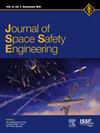宇宙 1408 号卫星的碎裂分析
IF 1
Q3 ENGINEERING, AEROSPACE
引用次数: 0
摘要
2021 年 11 月 15 日,俄罗斯宇宙 1408 号死亡卫星解体,引起了国内外媒体和研究人员的广泛关注。本文对这一事件进行了分析。根据美国太空监视网发布的 TLEs,分析了母体的轨道变化。利用碎裂碎片的轨道要素,初步确定了碎裂时间和强度等信息。最后,选择了低地球轨道上的两个航天器进行碰撞风险评估。分析了宇宙 1408 号分裂碎片(CBD)对国际空间站(ISS)和中国空间站(CSS)的影响。结果表明,CBD 对国际空间站和中国空间站的撞击风险不容忽视。本文章由计算机程序翻译,如有差异,请以英文原文为准。
Breakup analysis of Cosmos 1408 Satellite
On November 15, 2021, Russian dead satellite Cosmos 1408 broke up, which attracted widespread attention from media and researchers both domestic and foreign. This paper analyzed this event. According to TLEs released by US Space Surveillance Network, the orbit change of the parent body was analyzed. By using the orbital elements of breakup debris, the information such as breakup time and intensity was preliminarily determined. Finally, two spacecraft on LEO were selected to carry out the collision risk assessment. The impact of Cosmos 1408 breakup debris (CBD) on the international space station (ISS), and the China space station (CSS) was analyzed. The results show that the impact risk of the CBD on the ISS and CSS could not be ignored.
求助全文
通过发布文献求助,成功后即可免费获取论文全文。
去求助
来源期刊

Journal of Space Safety Engineering
Engineering-Safety, Risk, Reliability and Quality
CiteScore
2.50
自引率
0.00%
发文量
80
 求助内容:
求助内容: 应助结果提醒方式:
应助结果提醒方式:


